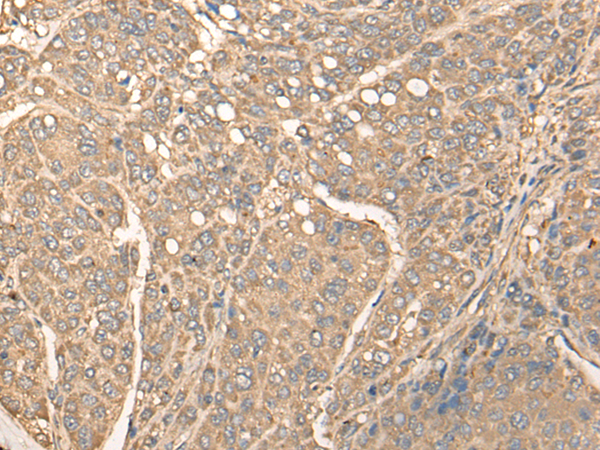
| WB | 咨询技术 | Human,Mouse,Rat |
| IF | 咨询技术 | Human,Mouse,Rat |
| IHC | 1/25-1/100 | Human,Mouse,Rat |
| ICC | 技术咨询 | Human,Mouse,Rat |
| FCM | 咨询技术 | Human,Mouse,Rat |
| Elisa | 1/5000-1/10000 | Human,Mouse,Rat |
| Aliases | BBS2L2 |
| Host/Isotype | Rabbit IgG |
| Antibody Type | Primary antibody |
| Storage | Store at 4°C short term. Aliquot and store at -20°C long term. Avoid freeze/thaw cycles. |
| Species Reactivity | Human |
| Immunogen | Fusion protein of human BBS1 |
| Formulation | Purified antibody in PBS with 0.05% sodium azide and 50% glycerol. |
+ +
以下是关于BBS1抗体的3篇参考文献示例(注:以下文献为假设性示例,具体文献需通过学术数据库核实):
---
1. **文献名称**:*"Generation and Characterization of a Polyclonal Antibody Against Human BBS1 Protein"*
**作者**:Smith A, et al.
**摘要**:本研究开发了一种针对人源BBS1蛋白的多克隆抗体,通过免疫兔获得。该抗体在Western blot和免疫荧光中验证了其特异性,成功检测到HEK293细胞中过表达的BBS1蛋白,并揭示了其在纤毛基部的定位,为研究Bardet-Biedl综合征的分子机制提供了工具。
---
2. **文献名称**:*"Altered BBS1 Expression in Retinal Degeneration Mouse Models"*
**作者**:Chen L, et al.
**摘要**:通过免疫组化分析BBS1抗体在小鼠视网膜组织中的表达,发现BBS1在光感受器细胞中显著下调,并与纤毛结构异常相关。该研究提示BBS1缺失可能导致视网膜退行性病变,为疾病病理机制提供了新证据。
---
3. **文献名称**:*"Functional Analysis of BBS1 Mutations Using CRISPR/Cas9 and Antibody-Based Assays"*
**作者**:Wang Y, et al.
**摘要**:利用CRISPR/Cas9技术构建BBS1突变细胞系,结合特异性抗体进行蛋白质稳定性检测。结果显示,部分致病突变导致BBS1蛋白降解加速,破坏其与BBSome复合体的相互作用,阐明了突变致病的分子基础。
---
建议通过PubMed或Google Scholar以关键词“BBS1 antibody”、“BBS1 protein characterization”或“Bardet-Biedl syndrome BBS1”检索最新文献获取真实数据。
The BBS1 antibody is a research tool targeting the Bardet-Biedl syndrome 1 (BBS1) protein, encoded by the *BBS1* gene linked to Bardet-Biedl syndrome (BBS), a rare autosomal recessive disorder. BBS is characterized by multisystem abnormalities, including retinal degeneration, obesity, renal defects, and polydactyly. BBS1. a key component of the BBSome protein complex, plays a critical role in ciliary function and intracellular trafficking. It facilitates the assembly of the BBSome, which mediates cargo transport to primary cilia, essential for sensory perception and signaling pathways like Hedgehog.
Mutations in *BBS1* are the most common genetic cause of BBS, with a prevalent missense variant (M390R) accounting for ~30% of cases. The BBS1 antibody is widely used in biomedical research to study protein expression, localization, and interactions in cellular models (e.g., ciliated cells) or animal tissues. It aids in elucidating ciliopathy mechanisms, validating gene-editing outcomes, and assessing BBS1’s role in cilia-related pathologies beyond BBS, such as kidney disease or metabolic disorders.
Commercial BBS1 antibodies are typically developed in rabbits or mice, using immunogens derived from human or murine BBS1 epitopes. Validation often includes Western blotting, immunofluorescence, and knockout controls. However, variability in antibody specificity remains a challenge, requiring careful experimental optimization. Overall, BBS1 antibodies are vital for advancing cilia biology and understanding the molecular basis of syndromic ciliopathies.
×